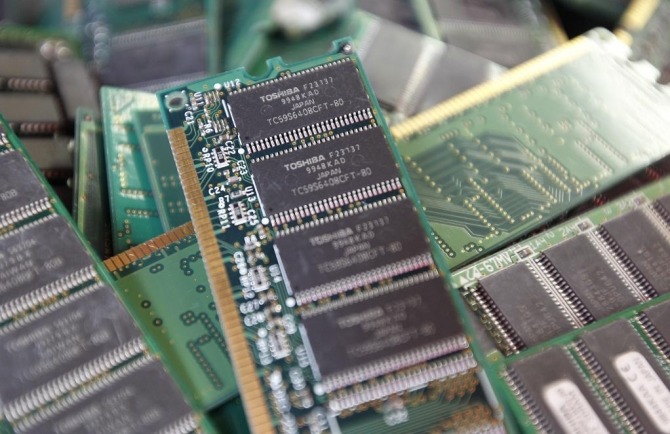Toshiba has reportedly shrunk the group of bidders for its memory business from about 10 to a number that may no longer include Apple, though no binding offers have been made, and more bidders could potentially join.
Several Apple-connected suppliers are still in the running, according to Bloomberg sources. These include assembly partner Hon Hai/Foxconn, memory maker SK Hynix, and Broadcom, the last in partnership with private equity firm Silver Lake Management.
Broadcom has been rumored as collaborating with Apple on new wireless charging technology that could premiere as soon as this year's iPhones, though a delay until later generations is possible.
Offers for the memory business have so far come in around $18 billion, the Bloomberg sources said. The Japanese government is expected to oppose any sale to Foxconn or SK Hynix on national security grounds, and indeed Toshiba will allegedly encourage Japanese companies to submit bids.
Although Toshiba's memory business is actually very successful and one of the biggest in the world, the company is selling off a majority stake to cope with over $9 billion in losses from its U.S. nuclear division, Westinghouse. That firm entered into Chapter 11 bankruptcy last week.
As recently as Monday Apple, Amazon, and Google were all rumored to be bidders, and it's not clear which if any of them might still be in contention.
For Apple controlling Toshiba's memory business would give it a steady supply of memory for Macs, iPhones, and other devices, which it might even been able to optimize like its A-series processors or W1 wireless chip. Conversely, it would suddenly have to cope with legacy clients and/or step into the wider memory industry, something Apple management is probably unwilling to do.
Allowing one of its suppliers to make the investment would eliminate obligations but still potentially lower costs and ensure good supply.
 Roger Fingas
Roger Fingas







 Malcolm Owen
Malcolm Owen
 Bon Adamson
Bon Adamson
 Marko Zivkovic
Marko Zivkovic
 Amber Neely
Amber Neely



 Christine McKee
Christine McKee


-m.jpg)






10 Comments
It does not make sense for Apple to be in the bidding directly, running a memory design and fab business is way outside Apple core competence. I suspect Apple may be backing one of this memory partners to make sure Toshiba's memory falls in to Apple friendly hands.
Somewhat related to this is the question of whether it makes sense for Apple to ever buy or build its own fabs. It probably doesn't.... but that's not 100% obvious due to Apple tremendous size.
There was a time when a fully integrated computer company like the old IBM or DEC would fab their own chips entirely for their own use. But those companies grew slower than the cost of building fabs, and so didn't have the economies of scale to keep chip manufacturing as a part of their vertically integrated structure.
But in the last 10 years Apple has grown faster (much faster, in fact) than the cost of building fabs, to a point where they might be operating at such a scale that totally internalizing chip production is warranted.
Maybe the thing that makes is unlikely for Apple has more to do with their management structure than their scale.
I would be curious on why you would put "may have dropped Apple" in the title as there is not indication that this is the case.